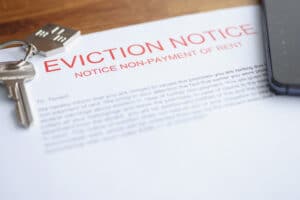Adverse Possession Laws Louisiana
In Louisiana, a squatter is basically someone who decides to live in a house or property that’s empty, deserted, or foreclosed, without asking the owner’s permission. And get this, they don’t own the place, and they don’t pay any rent!
Now, here’s the interesting part. The U.S. government has been looking out for squatters since way back in the 1850s. They want to make sure everyone knows that squatters are different from folks who do illegal stuff like trespassing.
So, squatters get their own set of rules, separate from the troublemakers.
In Louisiana, due to squatter laws, if someone lives in a house or on some land for a whopping 30 years without getting kicked out, they can actually own it legally. However, there are some tricky ways that squatters might speed up the process and snag your property before those 30 years are up.
Are All Squatters Trespassers?
 Squatters: These folks have some legal rights, but they switch over to being trespassers once the property owner makes it clear they’re not welcome anymore. So, squatters are kind of like the middle ground. They’re not doing anything wrong unless you tell them to go away.
Squatters: These folks have some legal rights, but they switch over to being trespassers once the property owner makes it clear they’re not welcome anymore. So, squatters are kind of like the middle ground. They’re not doing anything wrong unless you tell them to go away.
Trespassers: Now, trespassers are the ones who go onto a property without permission or stick around longer than they’re supposed to when the owner says, “You’re not wanted here!” For example, if you invite a friend over, and they refuse to leave when you ask nicely, they become trespassers. In most places, trespassing is against the law, but the owner has to prove the intruder didn’t have permission to be there.
Louisiana Adverse Possession Claim
Alright, check it out, guys! We’re talking about something called an “Adverse Possession Claim” in Louisiana. It’s basically when someone tries to claim a property as their own, even if they don’t own it in the first place. But there are some rules they gotta follow:
- They need to live on the property continuously for a whopping 30 years. But hold on, if they have some fancy papers called “color of title” that prove they think they own the place, they might get away with just 10 years of living there.
- No disappearing acts allowed! They can’t just move out and come back later. If they leave, the timer resets to zero.
- They have to be chill neighbors. Louisiana is different from other places because they say squatters can’t cause trouble or bother the folks around them. So, no disturbing the peace!
- They gotta be like, “Hey, I’m here!” Everyone should know they’re squatting there. No ninja moves, hiding, or anything like that.
- People must know for sure that they’re living there. It can’t be a big secret.
- Oh, and they should put up a fence or some kind of boundary around the place. Make it clear where their territory is.
So, in a nutshell, to claim someone else’s property in Louisiana, you gotta live there openly and peacefully for 30 years straight, with no breaks, and let everyone know you’re doing it. It’s a bit complicated, but hey, it’s the law!
They don’t have to pay property taxes or have those “color of title” papers, but having them can make things easier.
Color of Title in Louisiana
In Louisiana, they do acknowledge something called a “color of title” claim, but it’s not a huge deal when it comes to squatter stuff.
“Color of title” basically means that the person living on the property did things the regular way, like buying it from someone. But here’s the twist – they might be missing some important paperwork, like a title or deed, or maybe they didn’t register the property properly.
Now, suppose a squatter happens to have a legit “color of title” claim in Louisiana. In that case, they can actually grab ownership of the place after just ten years instead of the usual marathon of thirty.
How to Get Rid of Squatters Before Adverse Possession Claim is Filed
Alright, let’s talk about how to kick squatters to the curb before they can claim someone else’s property as their own.
Serve an Eviction Notice: The legit way to boot out squatters in Louisiana is by doing an eviction. No fancy rules for squatters here. If they’ve been hanging around for less than a month, you hit them with a five-day notice to quit. This applies to any lease rule-breaking, rent-dodging, or just squatting without permission. It gives them five days to pack up and leave. But if they’ve had a lease for more than a month (like holdover tenants), you gotta give them a bit more time—30 days.
Once that notice period is up, and they’re still playing house, you can take them to court with an eviction lawsuit. They can try to fight it, but chances are they won’t win. It might take a bit, but once the court gives the green light, the sheriff can kick them out.
Offer to Rent the Place to Them: Now, if you’re not all gung-ho about the whole eviction drama, you could actually offer the squatters a chance to rent the place like regular tenants. This move stops them from pulling off that adverse possession trick, gives them a legit place to live, and puts some cash in your pocket as the property owner.
Sell to a Cash Buyer: Okay, here’s a sweet deal if you just want these squatters out of your hair. You can sell the place as-is to one of those online cash buyers. These folks will buy almost any property in whatever state it’s in, and they do it quick.
Now, the price you get might be lower than what the place is worth on the market, but if you want to get rid of that abandoned property fast, it’s a solid option. The squatters then become someone else’s headache to deal with.
Frequently Asked Questions
 Is it possible to forcibly remove Squatters?
Is it possible to forcibly remove Squatters?
When it comes to booting out squatters in Louisiana, there’s one person with the power – the sheriff. But hold on, they can’t just kick them out whenever they feel like it. They need a green light from the court, and that’s called a “24-hour Writ of Possession.” So, it’s all official and legal before the sheriff shows up.
Do Squatters have to pay property taxes?
In Louisiana, squatters can try to claim a property without paying property taxes. But here’s the twist: if they actually do pay those taxes, it might give them a better shot at winning their case in court.


 Is it possible to forcibly remove Squatters?
Is it possible to forcibly remove Squatters?


